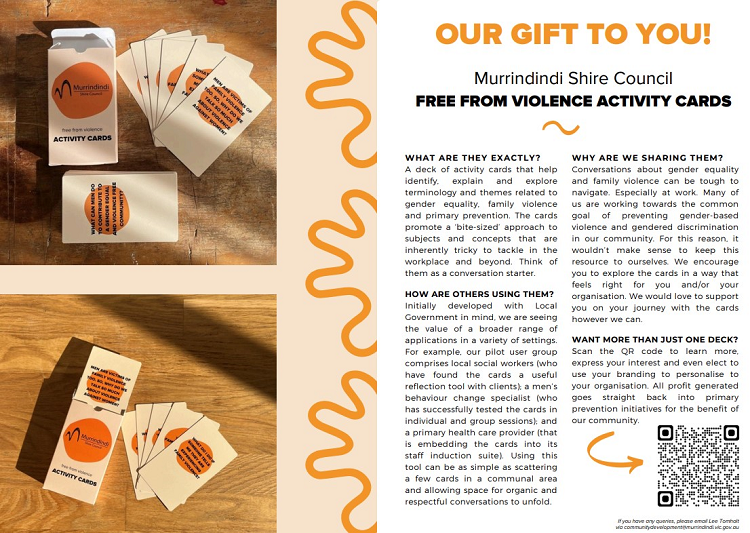Case Study: Murrindindi Shire Council
Free From Violence Activity Cards
Why it is important
A deck of activity cards that help identify, explain and explore terminology and themes related to gender equality, family violence and primary prevention.
Primary prevention is a new concept for many in a Local Government environment. For this reason (and because prevention concepts can be complex to grasp, requiring engagement with heavy academic content), the cards support a ‘bite-sized’ approach to subjects and concepts that are inherently tricky to tackle in the workplace and beyond. In developing the cards, Council considered and researched common misconceptions around gender equality, family violence and key concepts related to both that would benefit the community if more concise framing and narrative based approaches were framed as part of broader learning. For this reason, the cards offer a more interactive experience for users that encourages reflection, promotes curiosity and lowers barriers to understanding without judgement.
Engagement with the cards can take (and has taken) many forms, including as a conversation starter tool. However, there is also value for a broader range of applications in a variety of settings. For example, the cards can (and have) supported social workers (who have found the cards a useful reflection tool with clients); Men’s Behaviour change specialists (who have successfully tested the cards in individual and group sessions); primary health care providers (who are embedding cards into staff induction processes and more) and disability support services (who have used the cards in facilitated group sessions with young people seeking to participate in healthy relationships), despite their level of ability. The Department of Education has also expressed interest in using the cards in planning sessions with teachers to empower and equip them to consider how the roll out of Respectful Relationships in local schools could be enhanced. Even if leadership lacks the capacity to drive the use of the cards (which is understandable in smaller organisations or organisations where priorities expand to many areas), making the cards available to broader teams is still hugely beneficial to destigmatise tricky topics and contribute to a healthier culture overall.
Call to action
Conversations about gender equality and family violence can be tough to navigate, particularly in a professional environment. Many organisations and individuals are working towards the common goal of preventing gender-based violence and gendered discrimination. Council hopes that the successful roll-out of these cards will encourage others to consider that embedding prevention in the workplace is attainable and sustainable. Small steps are still important steps. The cards can be used regardless of organisational capacity and serve to build that capacity over time. How the cards are used can be paced self-determined. Council strongly encourage others to explore the cards in a way that feels right for them and/or their organisation.

